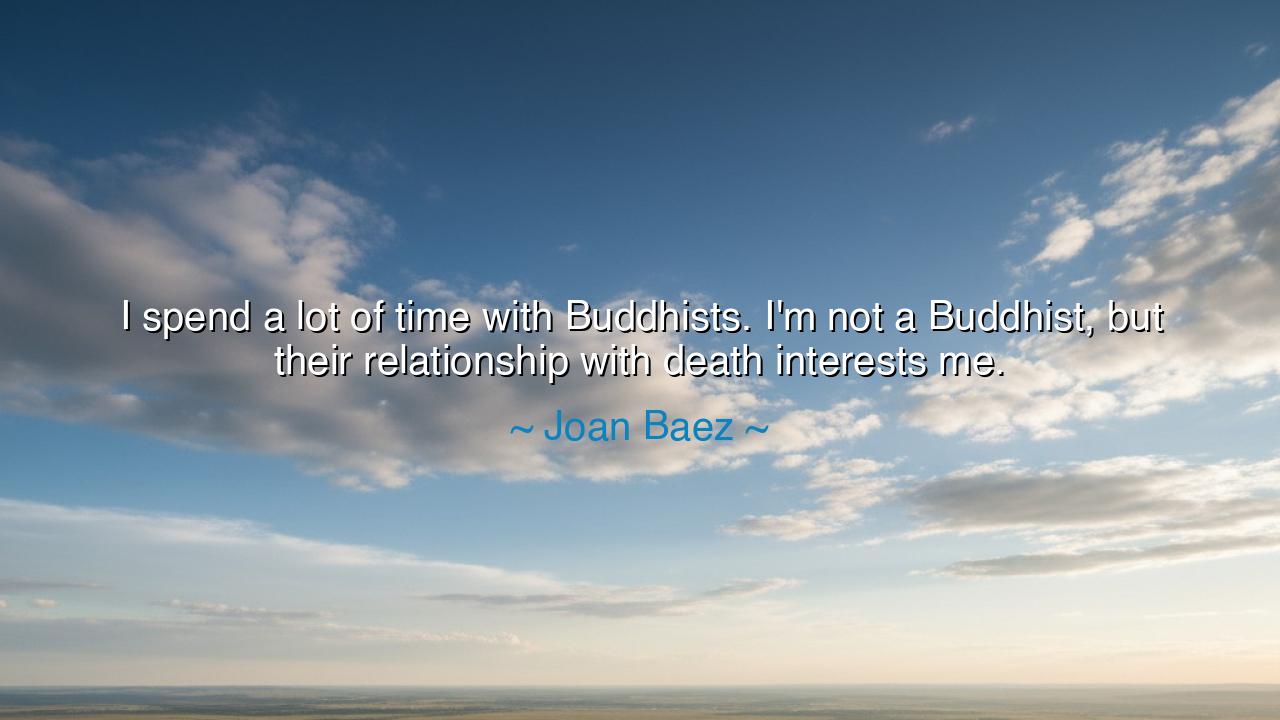
I spend a lot of time with Buddhists. I'm not a Buddhist, but
I spend a lot of time with Buddhists. I'm not a Buddhist, but their relationship with death interests me.






The legendary singer and seeker Joan Baez once said, “I spend a lot of time with Buddhists. I'm not a Buddhist, but their relationship with death interests me.” These words, spoken softly yet laden with spiritual gravity, reveal the heart of a pilgrim — one who has seen fame and sorrow, who has sung for peace yet knows that peace begins within. In this reflection lies not curiosity alone, but an ancient yearning: the desire to understand mortality, to make peace with the shadow that follows all living things. Baez’s fascination is not with death itself, but with the serenity with which the Buddhist faces it — the calm gaze that looks upon impermanence and does not turn away.
For the Buddhists, death is not a catastrophe, but a continuation — a turning of the wheel, the next breath of the infinite cycle of being. They teach that all things are impermanent: the body, the voice, the very moments we cherish. To cling to them is to suffer; to accept their passing is to be free. In this way, the Buddhist relationship with death is not one of fear, but of understanding — a tender acceptance that life’s beauty lies precisely in its transience. Joan Baez, who has seen both the rise of movements and the fall of dreams, recognizes in this philosophy something the modern heart has forgotten: that to be at peace with death is to truly live.
The ancients spoke of this same truth in many tongues. The Stoic philosopher Seneca wrote that a man cannot begin to live until he has learned how to die. The Samurai of old Japan meditated daily on their death so that fear could never master them. Even the Egyptians, builders of eternal tombs, did not glorify death but sought to understand it — to prepare the soul for its next journey. Across cultures and ages, the wise have always looked death in the eye, not to worship it, but to dissolve its power over the heart.
For Joan Baez, whose voice once rose like a cry of conscience during the fires of war and injustice, this fascination with Buddhist thought is no accident. She has lived among the suffering and the oppressed; she has sung of loss and of the frailty of human hope. To spend time with those who do not tremble before death is, for her, a form of healing. The Buddhist calm, their compassion, their awareness of impermanence — these are not theories, but medicines for the spirit. In a world that fears aging, disease, and the silence of the grave, Baez sees in Buddhism a gentler path: the courage to bow before the truth that all things change, and yet nothing is truly lost.
There is a story told of the Buddha himself, when a grieving mother came to him holding the body of her dead child. She begged him for a way to bring the boy back to life. The Buddha told her to bring him a mustard seed from a house untouched by death. She went to every home, but in each she heard the same reply: “Death has visited here.” At last, she returned with empty hands but an awakened heart. Through her sorrow, she learned what Baez seeks — that death is not a punishment, but a part of the great rhythm of existence, a river that carries all beings home.
From this story — and from Baez’s reflection — comes a profound lesson for every soul: to make peace with death is to free the heart from fear. When we deny death, we shrink from life itself. But when we accept it, each sunrise becomes sacred, each breath a miracle. The Buddhists, and those who learn from them, do not dwell morbidly on endings; rather, they live more deeply because they know that every encounter, every song, every act of kindness is fleeting and therefore precious.
So, my friend, take this wisdom into your own life. Do not flee from the thought of death; walk beside it. Let it remind you to love fiercely, to forgive swiftly, to savor the gift of the present moment. Sit in stillness sometimes, as the Buddhists do, and breathe with awareness of your own impermanence. For in that awareness lies not despair, but liberation. As Joan Baez discovered, to study the way of those who are unafraid of death is to glimpse the doorway to true peace — a peace that no fame, no fortune, no possession can offer.
And thus the teaching stands: befriend the truth of mortality, and you will learn the art of living without fear. The song of life becomes sweetest when we no longer seek to silence the silence that follows it.






AAdministratorAdministrator
Welcome, honored guests. Please leave a comment, we will respond soon